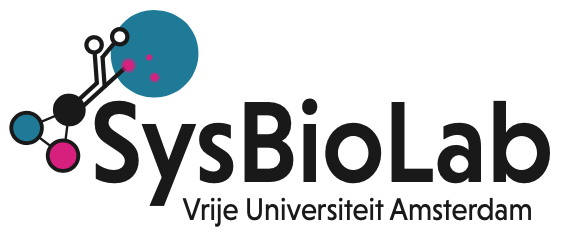Industrial collaborations
The Systems Biology Lab develops concepts and (computational and experimental) tools to understand the functioning of biological systems at the molecular level, and from an evolutionary perspective. We have a keen interest to apply these insights to industrial biotechnology challenges, such as strain selection for improved performance and robustness, or process optimisation.
We offer:
- Expertise in metabolism (see also the AIMMS Metabolism Core Facility)
- Genome-scale metabolic modeling expertise and (corporate IT compliant) computational tools for strain and process optimisation
- Biological interpretation of complex (-omics) data sets
- Experimental laboratory evolution options, including cell number, product yield and growth rate selection
Use case:
A good example of a successful collaboration with industry was the optimisation of the growth medium of the human pathogen Bordetella pertussis, the causative agent of whooping cough. We developed and validated a genome-scale metabolic model and used it to simplify the production medium and to replace inhibiting compounds by alternatives. This led to a 2.4 fold increase in product yield. You can read the details here.
Collaboration opportunities:
Within the different funding opportunities in the Netherlands we are open for collaboration with industry and other academic partners. Typically, such project requires some in kind or in cash contributions from industry and the commitment to attend regular progress meetings (2-4 times per year). The following links point to Dutch funding opportunities. The TTW open technology program allows a broad set of topics and proposals can be submitted all year round. Others are thematic and work with specific submission deadlines. There are often other options, please contact us.
Contract research
Please contact Prof. Bas Teusink
Student placements
Many of our students are interested in an internship at industry. Conversely, we can work with students on industrial problems using our expertise. Please contact Prof. Bas Teusink
Examples of current collaboration:
TiFN is a public-private partnership for multi- and interdisciplinary research in food and nutrition. Within this framework we participate in a project titled “Evolutionary trade-offs in dairy fermentation” where we collaborate with Wageningen University (Prof. Michiel Kleerebezerm), NIZO food research and 2 industrial parties from the food sector. The project employs four PhD students at 3 locations (2 of them in our group at the VU) and it focuses on the influence of cellular trade-offs on industrial fermentations. We are investigating the role for key enzymes in dairy fermentations including enzymes involved in growth, (post-) acidification, flavor- and texture formation. Through linking fundamental phenotypic trade-offs to industrially relevant properties we aim together with industry to finally improve dairy fermentations.
Many industrial fermentation processes aim at the production of primary or secondary metabolites. Examples of such metabolites include volatile flavour compounds in food fermentations, vitamins, antimicrobials, simple- and complex polysaccharides, organic acids and bio-fuel production. Industries are challenged to improve such fermentation processes either through process conditions or by improved strains. In this project, we aim to bring together micro-doplet culturing and selection techniques with synthetic biology with the aim of building generic screening platform to select for high-product yield. We collaborate with the group of Prof. Oscar Kuipers at the RUG Groningen in this project. The user committee of this projects consists of 4 multinational Dutch companies that are active in the food and biotechnology sector. This project is financed by the TTW open technology program
Many industrial biotechnological processes are carried out by consortia of bacteria, rather than single strains. To improve performances of such processes, the biotech industry currently relies mostly on screening-based selection of isolated strains with desired properties. However, these properties are very often influenced by other consortium members in unknown ways. Screening consortia is challenging, because only a tiny subset of all the many possible combinations can ever be tested. There is therefore a need to develop methods that can predict performance of strains in consortia, on the basis of the genome and selected phenotypic traits. This project aims to develop an integrative bioinformatics and modeling approach to predict microbial community functioning from the properties of the constituent isolates. We will do this through a real industrial use case: the design of microbial cultures for the production of yogurt.

Recent Comments